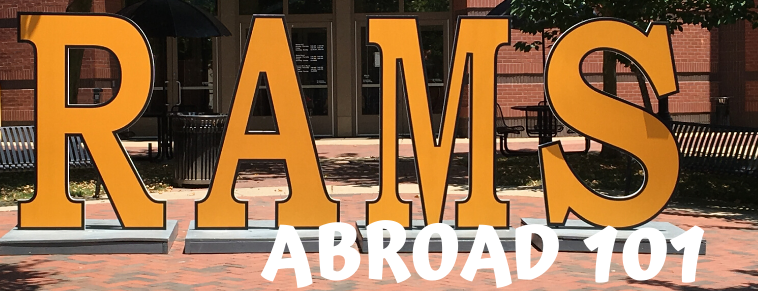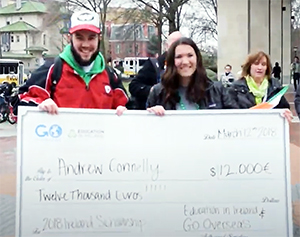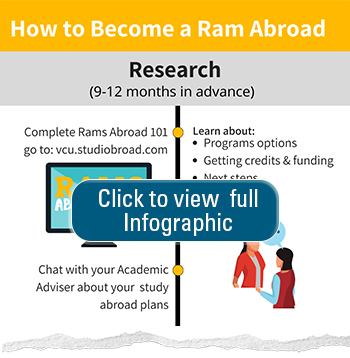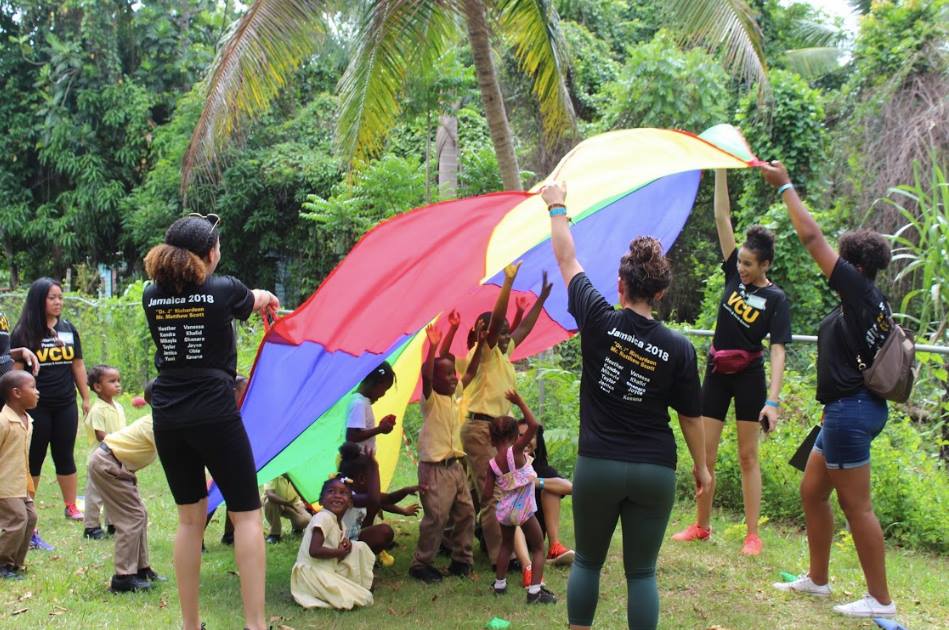
Navigating COVID-19 Abroad
COVID-19 has created unprecedented circumstances for all of us. Despite the uncertainties we face, studying abroad remains a valuable part of any student's educational experience.
During this time when much is still unknown, there are steps that you can take to maintain momentum in planning your study abroad experience.
We do not know what the future will hold. But we know it will come. And when it does you’ll want your study abroad plans to still be on track.
We are #OneVCU. And we are here to help. Click here to stay up to date with COVID related study abroad decisions.
COVID-19 FAQs
For the most up-to-date guidelines, please review the current advisories, additional guidance and travel information on VCU's Safety and Risk Management website.
- Virginia Commonwealth University requires all students traveling outside the U.S. for university-sanctioned travel to enroll in VCU's international health and emergency assistance insurance plan with Cultural Insurance Services International (CISI). This insurance plan covers health care costs incurred during university-sanctioned international travel and provides emergency assistance, including medical or security evacuations and repatriation of remains. *University-sanctioned student international travel includes any travel activities outside the United States of America or its territories engaged in by admitted undergraduate, graduate, or professional degree- or certificate-seeking students including credit- and non-credit-bearing experiences; this includes group and individual international programs and experiences facilitated by the Global Education Office (GEO), by other units, or undertaken independently by an individual student as a part of their education.
-
Curious to know more about CISI benefits regarding COVID-19 like coverage for testing, support, illness, risk, evacuation, and more? Read answers to frequently asked CISI COVID-19 questions.
Per CDC guidelines, all international travelers should make sure they are up to date with their COVID-19 vaccines before travel. Per CDC guidelines for international travel, vaccination is still the best way to protect yourself from severe disease and slow the spread of COVID-19. VCU encourages but does not require full vaccination. Travelers may be subject to requirements imposed by non-VCU entities, including vaccination and testing requirements, where applicable. Unvaccinated travelers should follow the CDC’s current recommendations regarding pre- and post-travel COVID-19 testing and quarantine.
-
Various arrival and departure travel health requirements including testing, quarantining, proof of vaccination, and more;
-
Host institution coursework modalities and academic contingencies (i.e. plans to move from in-person to remote learning if/when necessary to do so);
-
Local and/or institutional restrictions and public health rules on distancing, masking, testing, and more;
-
Travel restrictions within host country and to other countries
-
Different financial commitment and reimbursement policies
-
VCU's Global Education Office and International Travel Advisory Committee (ITAC) monitor resources such as U.S. Department of State travel advisories and CDC travel health notices and will contact study abroad participants using their VCU email addresses if and when there are changes in travel risk for destinations abroad that will impact the ability to offer or continue programs in those countries;
-
Please refer to the FAQs on the ITAC page for more information on changes in U.S. Department of State travel advisories and university sponsored travel restrictions
-
Students are strongly encouraged to self-enroll in the State Department's Smart Traveler Enrollment Program (STEP) and to regularly monitor messages from their destination's US embassies before and during international travel. For more safe travel information, please visit the Health & Safety section of our website.
-
Review your program’s refund/cancellation policies very closely so that you are aware of dates, deadlines, your responsibilities, and protocols for program cancellation;
-
Carefully monitor your destination’s travel advisory levels with the U.S. Department of State and U.S. Centers for Disease Control and Prevention;
-
Consider investing in Cancel For Any Reason or Interrupt For Any Reason (CFAR/IFAR) insurance coverage. We encourage you to research options through CISI’s partnership with Travel Insured International. This is not a VCU requirement or sponsored policy but is available to you if you’re interested in additional coverage for an (sometimes significant) additional cost;
-
Discuss creating a financial plan with your Education Abroad Adviser.
As soon as you know you want to study abroad, we recommend that you begin the passport application or renewal process. Ideally this will be about six months prior to departure to allow time for your application to be processed and for you to apply for a visa if needed. Learn more about passport and visa processes at this website. As of late 2021, the U.S. Department of State indicates that the average processing time for new passport applications is currently 18 weeks (12 weeks for expedited service).
- You should regularly (at least once a week) monitor the U.S. Department of State travel advisory level of the country in which you hope to study abroad as well as local and international news about your destination to learn of any changes on the ground regarding potential lockdowns, border restrictions, and other updates or requirements.
- You must submit a petition to VCU’s International Travel Advisory Committee (ITAC) to be able to participate in your program in a level 3 or 4 country. Please review the FAQs on the ITAC webpage.
- If you decide to commit to a study abroad program in a level 3 or 4 destination, you should wait until as close to the deadline as possible, and carefully consider whether to pay any non-refundable fees or deposits depending on the situation on the ground. If there is no cost to apply to your program, then you should be aware of the date(s) by which you would need to commit, withdraw, or be held financially liable for program costs. Carefully weigh the financial liability you are willing to incur amidst the uncertainty of travel to a Level 3 or 4 country.
- Contact the program sponsor to inquire about their tripwires for cancelling the program, as well as their contingency plans.
- Consider if you are able to defer study abroad to a later term in the hopes that the travel advisory level will have decreased and the situation surrounding COVID will have improved. Your experience abroad would likely also have more opportunities and be less restricted by potential lockdowns, border closures, and other effects of studying in a higher-risk destination. Be sure to discuss your curriculum plan with your academic adviser and see where you might have the flexibility to adjust your academic schedule.
- Given the uncertainty in global travel, it is important for you to have a contingency plan. Be sure to register for VCU classes during your normal registration period, and plan to drop them by the end of VCU's add/drop period if you are able to study abroad.
- Please keep your study abroad and academic advisers aware of your plans to study abroad, as well as any changes to those plans.
- VCU's Global Education Office and International Travel Advisory Committee (ITAC) monitor resources such as U.S. Department of State travel advisories and CDC travel health notices and will contact study abroad participants using their VCU email addresses if and when there are changes in travel risk for destinations abroad that will impact the ability to offer or continue programs in those countries.
- VCU's Global Education Office will also maintain direct contact with the faculty member leading your program so be sure to pay attention to their updates.
- Please refer to the FAQs on the ITAC page for more information on changes in U.S. Department of State travel advisories and university-sponsored travel restrictions.
- Students will be automatically enrolled in the State Department's Smart Traveler Enrollment Program (STEP) and to regularly monitor messages from their destination's US embassies before and during international travel. For more safe travel information, please visit the Health & Safety section of our website.
This is program dependent and each program will have a decision date posted. Please check your program site for details.
- We will communicate with emergency contacts (whom you listed in your VCU application) if there is a substantial change or threat to the normal operation of the program you are participating in. Updates will be communicated primarily via email.
- If your parents/family have concerns, they can also contact the VCU Education Abroad Office at abroad@vcu.edu or 804-827-7882.
- After the program decision date, you will be held responsible for the following withdrawal procedures and financial commitment policy.
- All withdrawals must be made formally in writing and submitted to the Director of Education Abroad. Otherwise, the program fee will not be refunded. After committing to the program, students deciding to withdraw will be held accountable for a portion of or the entire program fee based on the following schedule:
- Formal withdrawal submitted later than 30 days before the first day of the program abroad: 100% of the program fee will be charged
- Formal withdrawal submitted within 30-60 days before the first day of the program abroad: 75% of the program fee will be charged
- Formal withdrawal submitted within 60-90 days before the first day of the program abroad: 50% of the program fee will be charged
- In the event an unexpected emergency occurs within 30 days before the first day of the program abroad, students must provide a physician’s certification that his/her condition prohibits participation. In this case, refunds will be limited to only those funds VCU is able to recover or that have not already been spent on behalf of the student.
Yes, prior to the program decision date, you can defer to a future term. However, after the program decision date, you cannot defer and you will be held responsible for the following withdrawal procedures and financial commitment policy. Please see the previous question about withdrawals to understand what will occur if you defer after the program decision date.
No, 100% of the program fee will be charged for a formal withdrawal submitted later than 30 days before the first day of the program abroad.
- VCU's Global Education Office and International Travel Advisory Committee (ITAC) monitor resources such as U.S. Department of State travel advisories, CDC travel health notices and local public health officials. Other considerations include COVID-19 positivity rates, vaccination rates, access to local healthcare, availability of U.S. citizen services at the local embassy or consulate, and any international travel restrictions in deciding whether to modify a program.
- Should your host destination increase to a Level 4, VCU will use the aforementioned resources to determine if an early return to the United States is necessary. These decisions will not be taken lightly and prompt communication will ensue.
Yes! Part of study abroad is engaging in person with your classmates and host community. However, there will be contingency plans for class to pivot online should the need arise and some coursework may be assigned to occur virtually before, during, or after the program’s travel dates.
- Yes. Every VCU faculty-led program will have an academic continuity plan in the unfortunate event that your classes are moved on-line and/or you have to return to the United States early to complete your program remotely.
- For programs that offer transfer credit, a contingency plan will be in place between your faculty member and the host institution/program.
- VCU strongly discourages independent travel during official VCU program dates.
- Students who choose to travel away from their program site will be responsible for any consequence, inconvenience or additional costs incurred due to border closures, COVID-19 restrictions, or requirements like testing or quarantine.
- Program directors may decide at any time to restrict independent travel during the study abroad program.
- We strongly discourage visitors during official VCU program dates.
- If your family really wants to travel to your host destination, we suggest you make plans before or after your program dates.
- If anyone visits you during your study abroad program, they are not permitted to join your group for any activities and are not permitted to visit your housing unit. This includes family and friends from the U.S., as well as new local friends in your host country.
Group flights may be required of participants in faculty-led programs and will be communicated by the faculty program leader and VCU Global Education Office (GEO) staff. If group flights are not required for your program, we strongly advise students to wait until GEO staff have given the green light to proceed with purchasing airfare. This will happen once VCU has enough students committed to participate in the program. Discuss your flight preferences with your faculty program director, and if/when you purchase your tickets, be sure to research the specific cancellation or rebooking policies and consider purchasing flight insurance at the time of booking. Booking with a more flexible airline or a flexible type of ticket may cost more but it can also provide peace of mind. VCU is not able to offer assistance with reimbursing flight costs.
Yes! Whether it’s picking out multiple programs that work for you, having a plan for how you would spend your time stateside in case you don’t end up going abroad, or eyeing multiple flight options, we encourage students to be flexible and open to change. International travel takes a lot of planning and it’s common for last minute changes, especially in the era of COVID-19. If you’re committed to global learning, VCU will do everything we can to help you gain that experience. Be sure to check out virtual program options (which include virtual internships) as a backup option.
Health & Safety FAQs for Faculty-led Programs
- Virginia Commonwealth University requires all students traveling outside the U.S. for university-sanctioned* travel to enroll in VCU's international health and emergency assistance insurance plan with Cultural Insurance Services International (CISI). This insurance plan covers health care costs incurred during university-sanctioned international travel and provides emergency assistance, including medical or security evacuations and repatriation of remains.
*University-sanctioned travel includes: studying and interning abroad, research or service-learning abroad, and other travel connected to VCU related activities or that are funded by VCU. - Curious to know more about CISI benefits regarding COVID-19 like coverage for testing, support, illness, risk, evacuation, and more? Read through answers to frequently asked CISI COVID-19 questions.
- If you are interested in purchasing additional insurance for travel and trip cancellation or interruption, we encourage you to research options through CISI’s partnership with Travel Insured International. This is not a VCU requirement or sponsored policy but is available to you if you’re interested in additional coverage for an additional cost.
Per CDC guidelines, all international travelers should make sure they are up to date with their COVID-19 vaccines before travel. Per CDC guidelines for international travel, vaccination is still the best way to protect yourself from severe disease and slow the spread of COVID-19. VCU encourages but does not require full vaccination. Travelers may be subject to requirements imposed by non-VCU entities, including vaccination and testing requirements, where applicable. Unvaccinated travelers should follow the CDC’s current recommendations regarding pre- and post-travel COVID-19 testing and quarantine.
All students who participate in education abroad must be fully vaccinated; therefore, VCU will not implement daily health surveys or formal symptom monitoring. Surveillance testing will not be implemented unless required by the host institution/organization or by the host destination. Students are expected to monitor their own health and report any symptoms or known exposure of COVID-19 to the faculty program leader in a timely manner.
VCU will follow the requirements of the host country in regards to contact tracing and other public health requirements related to the global pandemic. Requirements may vary depending on the destination country.
If a student tests positive prior to departure, follow the CDC travel guidelines for travel; also be sure to follow the entry requirements of your host country which can be found by visiting the U.S. embassy COVID-19 page for your destination (you can find the link by visiting the U.S. Department of State travel advisory for your destination). Additionally, follow the entry requirements of your host institution. If you are asymptomatic or have recovered from COVID-19 but are still testing positive, you will need a doctor’s note to be cleared for travel.
If a student tests positive during or at the end of the study abroad program, students must follow all guidelines of your host country and host program for quarantine and isolation requirements. These guidelines vary country-to-country and are not always in line with the CDC; however, when abroad the host country guidelines have authority and must be followed. The VCU faculty program leader will coordinate with VCU/GEO, CISI insurance, and on-site partners to arrange for quarantine or isolation accommodations if it is deemed medically necessary by a recognized authority that you isolate. VCU’s policy with CISI includes a $5,000 limit for trip delay coverage which can be used for accommodations, meals, and local transportation expenses (with receipts) for a medically necessary quarantine or isolation which must be declared by a physician or other recognized authority in order to be triggered. Students must be prepared to pay all related quarantine expenses such as accommodations, meals, transportations, medical care, etc. out of pocket as the trip delay (quarantine) benefit requires students to file a claim in order to be considered for reimbursement after-the-fact; please note that your claim for quarantine must be approved by CISI in order to be reimbursed and quarantines must be ordered by a medical professional in order to be covered.
Students who have been exposed to someone who tests positive should contact a physician at a local health provider to determine next steps. VCU’s policy with CISI includes a $5,000 limit for trip delay coverage which can be used for accommodations, meals, and local transportation expenses (with receipts) for a medically necessary quarantine or isolation which must be declared by a physician or other recognized authority in order to be triggered.
Students should bring their own masks, hand sanitizer, and cleaning supplies. Supplies may be obtained from VCU Facilities Management prior to departure:
- VCU Facilities Management provides disinfectant supplies, including hand sanitizer and disinfectant spray stations, throughout campus based on supply. Students and employees can use their VCU ID to obtain hand sanitizer, disinfectant wipes and face coverings at no cost from vending machines located throughout campus. Individuals are allotted one swipe per item per month (i.e., one of each item can be obtained each month).
- Monroe Park Campus vending machine locations:
- Bowe Street Parking Deck, 1st floor, elevator lobby
- Snead Hall, East Hall, center lobby across from the security desk
- T. Edward Temple Building, auditorium wing across from the atrium entrance, between Rooms 1160 and 1165
- James Branch Cabell Library, 1st floor, center of building, near the copy machines
- Student Commons, 1st floor, near Suite 104
- MCV Campus vending machine locations:
- Larrick Student Center, right of Starbucks
- Health Sciences Library, 1st floor, left of the main entrance, near the elevators
- VCU Health Sciences Research Building and Annex, 1st floor, lobby
- McGlothlin Medical Education Center, 1st floor, across from the elevators
- Hunton Student Center, 1st floor, right of the information desk
- Monroe Park Campus vending machine locations:
- Yes, your faculty program leader will coordinate with VCU/GEO, CISI insurance, and on-site partners to arrange for quarantine or isolation accommodations if it is deemed medically necessary by a recognized authority that you isolate. VCU’s policy with CISI includes a $5,000 limit for trip delay coverage which can be used for accommodations, meals, and local transportation expenses (with receipts) for a medically necessary quarantine or isolation which must be declared by a physician or other recognized authority in order to be triggered.
- Students must be prepared to pay all related quarantine expenses such as accommodations, meals, transportations, medical care, etc. out of pocket as the trip delay (quarantine) benefit requires students to file a claim in order to be considered for reimbursement after-the-fact; please note that your claim for quarantine must be approved by CISI in order to be reimbursed and quarantines must be ordered by a medical professional in order to be covered.
- Please note that expenses for government required quarantines upon arrival are not covered under the CISI policy. VCU does not plan to offer study abroad programs that require quarantine upon arrival in 2022; however, if a faculty-led program’s destination required it for future programs, the costs would be factored into the program fee paid by all participants.
Yes, if there is a medical need (i.e. symptoms present or exposure), testing will be available through a local medical provider and will be covered through the University’s insurance policy with CISI in which you will be enrolled through GEO.
- If you are facing a medical emergency, go to the nearest hospital or clinic. If you have time to research an English-speaking facility, you can check CISI recommended facilities through their mobile app. The CISI health insurance will work at any medical facility; unlike in the U.S. where you have in-network and out-of-network, CISI insurance is “in-network” everywhere.
- Be sure to keep any receipts in case you need to file a claim to be reimbursed.
- The answers to each of these questions will vary depending on what your destination country is. It is possible that you will need to be vaccinated, or to have a negative COVID-19 test, or that you will need to quarantine upon arrival.
- Learn more about your country's specific requirements - select your host country, then click on “Entry, Exit and Visa Requirements." You may be redirected to your host country's Embassy COVID-19 page for entry/exit requirements.
Please check the CDC travel guidelines for the most up to date re-entry guidelines for when it is time for you to return to the U.S.
Additional Resources
Complete Rams Abroad 101

Take your first step to studying abroad. Completing the Rams Abroad 101 video series is your first step in the study abroad process. Here, you will find tips for getting started, choosing a program, finding funding, and more.
Connect virtually with an advisor
We’re still here to help. After you have completed Rams Abroad 101, connect with a study abroad advisor, to further discuss your options. Check out this encouraging video from our study abroad advisors.
| Where would you like to go? | |
| Asia | Africa |
| Australia, New Zealand and Oceania | Europe (except UK, Ireland & France) |
| France and French-speaking locations | Latin America & Caribbean |
| Middle East | Multi-country programs |
| UK and Ireland | Russia |
| Schedule a virtual advising appointment | |
Explore funding options
 The cost of studying abroad varies depending on the program. Work with your Education Abroad adviser to find a program that fits your financial needs and budget. There are many affordable study abroad programs and your federal financial aid, institutional scholarships and more can be applied to help you fund your experience abroad.
The cost of studying abroad varies depending on the program. Work with your Education Abroad adviser to find a program that fits your financial needs and budget. There are many affordable study abroad programs and your federal financial aid, institutional scholarships and more can be applied to help you fund your experience abroad.
Right now, you can start exploring funding options, like scholarships and grants that are available for study abroad. Make note of deadlines and start developing any necessary essays. Here are some resources to get you started.
VCU's National Scholarship Office
U.S. Study Abroad Scholarships and Grants List (NAFSA)
 Think about timing
Think about timing
- It is never too early to be thinking about studying abroad for future terms. View or download the full accessible version of How to Become a Ram Abroad infographic. The timeframes presented are suggestions. Students can speak with an adviser to get started anytime.
-
Stay up to date on VCU's travel guidance by reviewing current advisories, additional guidance and travel information on VCU's Safety and Risk Management website.
.

Get started now
When planning your study abroad, you will need to gather some information. Now is the perfect time to start exploring your options!
- Research countries and programs
- Talk with your academic adviser about the best time in your academic schedule to go abroad and what courses would be good to take
- Talk to returnees about their experience abroad. Ask an Education Abroad adviser to put you in touch with a returnee by emailing abroad@vcu.edu.
 Think outside the box
Think outside the box
Virtual internships and classes can provide you with a unique and cost effective opportunity to explore global programs from the comfort of your home. While there is no substitute for an in-country experience, virtual programs offer a way to explore another culture, get specific internship experience, take classes not offered at VCU and gain invaluable intercultural, professional and academic skills. You can add a virtual internship or course to what you're already planning to take at VCU.